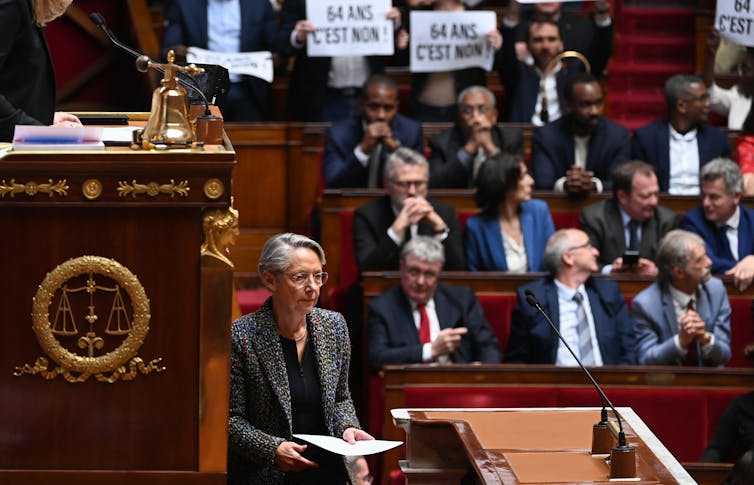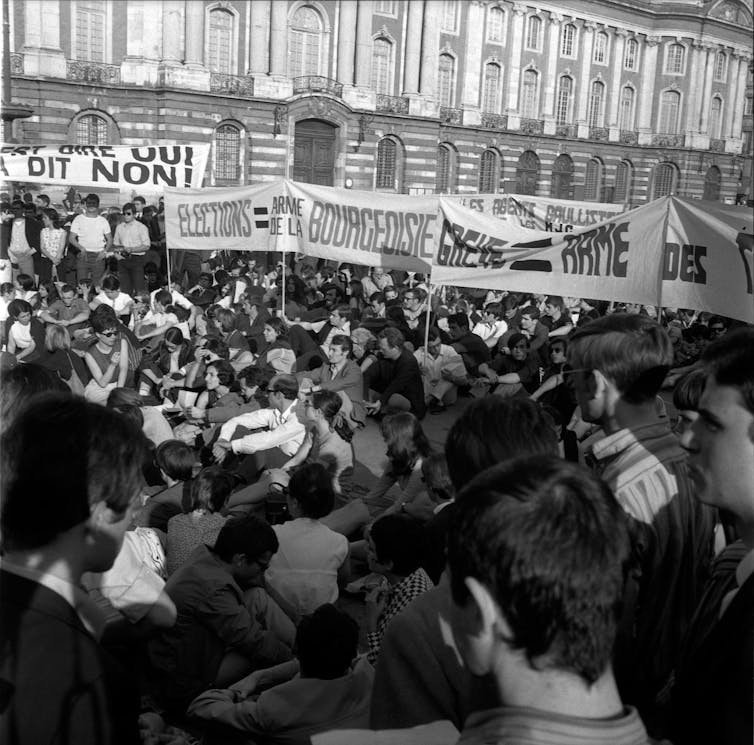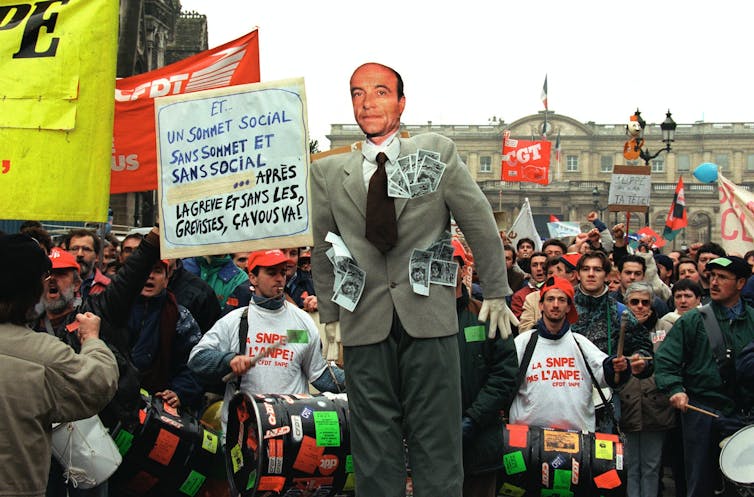Far from constituting an exception, March 16 marks the 100th time under France’s Fifth Republic that the executive has drawn on special powers to force through an unpopular measure, writes Mathias Bernard.

By Mathias Bernard
Université Clermont Auvergne (UCA)
 Emboldened by united trade unions, the tug of war between the street and the government over Emmanuel Macron’s pension reform had mostly taken on the form of strikes and demonstrations since mid-January.
Emboldened by united trade unions, the tug of war between the street and the government over Emmanuel Macron’s pension reform had mostly taken on the form of strikes and demonstrations since mid-January.
However, the government’s decision to bypass the lower chamber by invoking Article 49.3 of the French constitution on March 16 has now sharply pitted Macron’s relative majority against opposition parties. On March 20, it survived a critical no-confidence vote by a mere nine votes, precipitating the adoption of the bill and prompting thousands to pour into the streets in spontaneous protests.
Meanwhile, an ever-growing majority of French people and protesters reject legislation that would increase the minimum retirement age from 62 to 64.
Far from constituting an exception, March 16 marks the 100th time under France’s Fifth Republic that the executive chose to draw on special powers to force through an unpopular measure. President Macron used the article once in his first term (2017-2022), and 11 times since the start of his second term, in June 2022.
Introduced in the Fifth Republic’s Constitution in 1958 authored by Michel Debré, Article 49 paragraph 3 of France’s Constitution – known widely as “49.3” – was intended to “rationalise” the parliamentary system and resolve crises and deadlocks by handing over the reins to the executive.
Regardless of their affiliation, successive French governments over the last 20 years have almost systematically resorted to it to pass projects that profoundly modify the country’s welfare system or labour regulations — even if it means backing down afterwards under pressure from the street.

An occupied square in Toulouse during the May 1968 movement. (André Cros/Wikimedia)
May 68 Also a Parliamentary Crisis
A key reference in the history of protest movements over the past 50 years, the crisis of May 68 did not just take place in the lecture halls and in the streets. It also inspired opposition to Gaullism, the political thought spawned by the leader of French resistance during World War II and former President Charles de Gaulle (1959-1969).
Worn out by 10 years in office, de Gaulle hung to power by a threadbare majority, be it in public opinion or the National Assembly. On 24 April 1968, a vote of no-confidence on public broadcasting reforms failed to succeed for lack of eight votes. As the executive grappled with how it ought to respond to the demands of students and employees, the opposition issued a new no-confidence vote, which was discussed in a climate of extreme tension on 21 and 22 May .
Then the leader of the non-communist left, François Mitterrand (who went on to become president from 1981 to 1995), spoke of a regime crisis which undermined the “system” in power and called for a political “alternative” that he was ready to embody. Although critical of the government’s management of the crisis, Valéry Giscard d’Estaing (president from 1974 to 1981) and his Independent Republican group stood by the executive. The no-confidence vote failed, with 233 deputies voting in favour – 11 short of the 244 required.

Above: Michel Debré, prime minister from 1959 to 1962, was the author of the constitution of France’s Fifth Republic. Below: then-president Charles de Gaulle. (Wikipedia, CC BY)
The parliamentary win didn’t suffice to restore the legitimacy of the government, however, amid unrelenting student and workers’ protests. On 30 May, de Gaulle therefore followed the advice of his prime minister, Georges Pompidou, by triggering new parliamentary elections after having toyed for a time with the idea of a referendum over the reform.
Tapping into fears of revolutionary disorder, the Gaullists secured an unprecedented majority in the legislative elections of 23 and 30 June 1968. But the victory was then, once again, precarious, and all too tied to that particular context. In reality, the civil unrest of 1968 dealt a severe blow to the government, prompting de Gaulle to resign 10 months later following the failure of the April 1969 constitutional referendum on government decentralisation.
Mass Protests
Mass demonstrations rocked the executive again in 1984. Led by Pierre Mauroy (prime minister under François Mitterand from 1981 to 1984), the predominantly socialist government faced virulent opposition over the Savary bill, which aimed to create a unified and secular national-education system.
The government had the majority needed to adopt the text, which was part of 110 proposals put forward by Mitterrand in 1981. However, it succumbed to the use of Article 49.3 on 23 May 1984, to push the bill after a first reading in the national assembly.
Pressure on the street and in public opinion was such that Mitterrand eventually announced the withdrawal of the bill on 12 July 1984, resulting in the resignations of Education Minister Alain Savary and Prime Minister Pierre Mauroy.
Two years later, Jacques Chirac took the same decision amid large-scale protests against the Devaquet bill, which sought to allow universities to select students and introduce competition within higher education.
1995: The Mother of All Protests Against French Pension Reform
Between 1988 and 1993, socialist governments only enjoyed relative majorities in the national assembly. But when they resorted to Article 49.3 or faced no-confidence votes that sometimes nearly toppled them, it was never in a context of mass or radical protests over reforms.
This changed in November-December 1995 with opposition to an austerity package known by the name of the then prime minister, Alain Juppé. Intended to tighten to public finances ahead of France’s adoption of the euro currency, the reforms would have – among others – raised employees’ contribution to retirement funds and aligned specialised retirement regimes with that of the general public.
The bill provoked unrest on a scale unseen since 1968, even though the government held a large majority in the two assemblies. As in 1986, the government ended up withdrawing its bill on 15 December 1995, without consulting the national assembly.

Demonstrators wave banners and a puppet at the effigy of Prime Minister Alain Juppé, on Dec. 12, 1995. (Derrick Ceyrac/AFP)
Socialist President François Hollande (2012-2017), too, made copious use of the article. To his great displeasure, the then Economy Minister Emmanuel Macron saw his framework bill deregulating work — including plans to extend night and Sunday work — shoehorned into law without a vote. Likewise, the labour law put forward by the Myriam El Khomri was forced through on the first reading (on 10 May 2016) and upon final adoption (on 21 July).
Passing a Law Not the End of Story
Under Macron’s first mandate (2017-2022), Prime Minister Édouard Philippe resorted to Article 49.3 once on 29 February 2020, to push through the pension bill which, at the time, intended to replace France’s special retirement regimes with a universal system. The government enjoyed the necessary majority to pass the text, but it wanted to bring a swift close to protests which, one year after the “gilets jaunes” movement, undermined its political and electoral base.
On 16 March 2020, Macron nevertheless justified pausing deliberations over the reform on the grounds of the Covid-19 pandemic. Since taking up office, his uncompromising stance toward social demands has provoked the uproar of trade unions and undoubtedly contributed to the evolution of his electorate toward the moderate right.
Elisabeth Borne’s government is not the first to use its authority in parliament to pass controversial reform and to try to put an end to a turmoil which, if it were to continue, would hurt the government’s reputation.
However, a parliamentary victory acquired through Article 49.3 or the rejection of a no-confidence vote is not enough to regain legitimacy – Charles de Gaulle himself experienced this in May 1968. Several laws adopted in this way were not promulgated. Thus, in no way does the vote on Monday March 20 bring an end to a particularly delicate episode for the presidency of Emmanuel Macron.![]()
Mathias Bernard, historien, Université Clermont Auvergne (UCA).
This article is republished from The Conversation under a Creative Commons license. Read the original article.

In France you only run the risk of losing a hand or an eye in a confrontation with the cops. During the Yellow Vests uprising, the only death was that of a old woman at her upper-storey window. Misguided cop-thrown gas canister.
All governments ignore the people. History reflects that. We have come to expect that. We ourselves elect on promises then are betrayed every time.
We just don’t rebel.
The kings rule will in time fail. Not sure whether it is this time. But it will fail.
It’s clear that France does have a democracy, at least a large core of people who are concerned enough to protest. This is in steep contrast to the Americans who ironically started the revival of democracy.
After watching Western “democracy” in action in the States, in France, in the UK as well as in the EU commission and parliament with its only passing resemblance to an actual people’s democracy, it’s no wonder that the international rules based order that it promotes is so vacuous.
Well, at least the French get up off their couches and exercise their agency against the government. Americans can be somewhat forgiven for not doing that as you run the real risk of being murdered by some jack booted thug who will get away with it.
In France you only risk losing a hand or an eye.